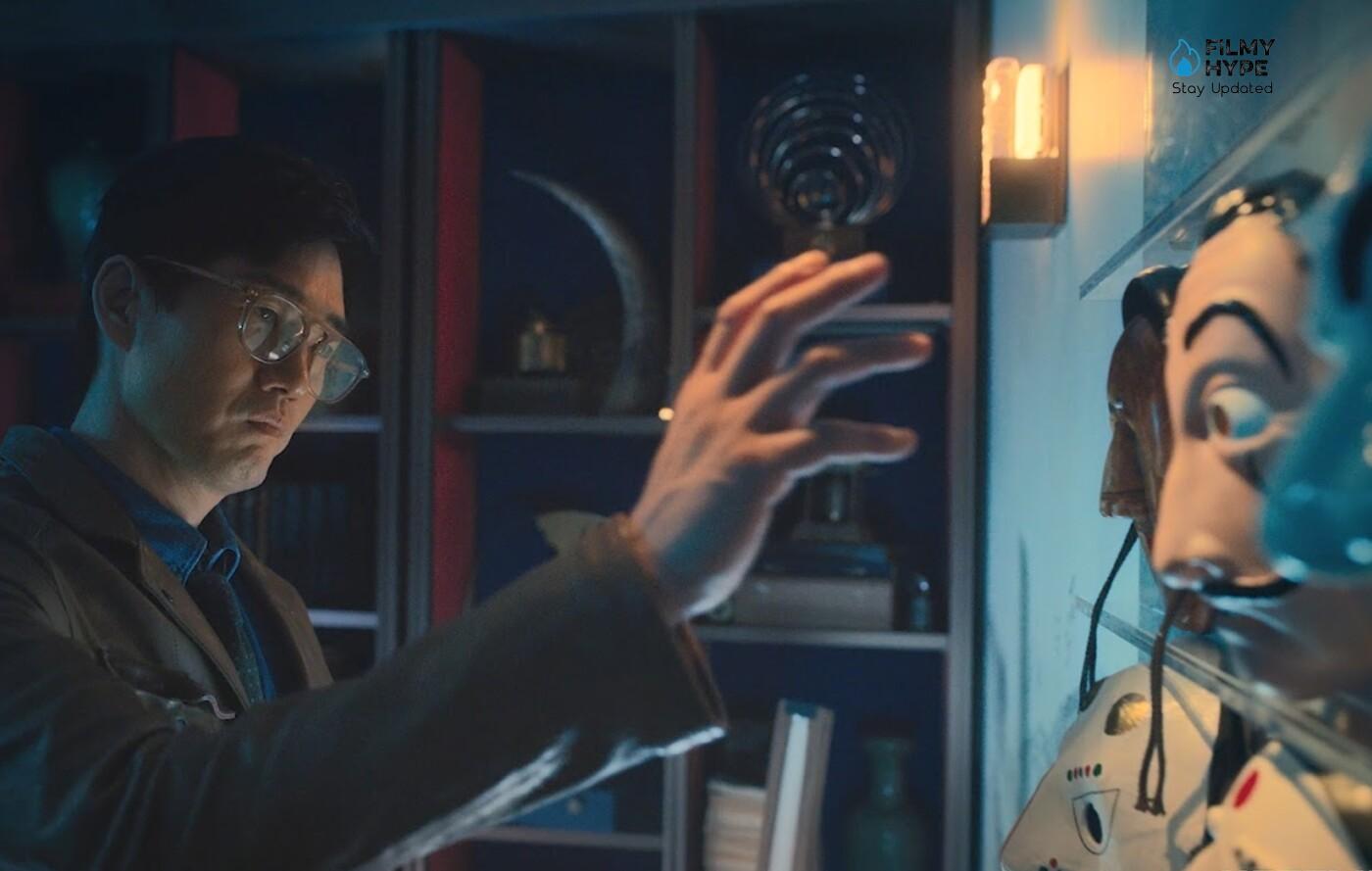Money Heist Korea Review: A Great Blow To Which The “Great” Is Left Over, But Deserves A Chance
Cast: Yoo Ji-tae, Jeon Jong-seo, Park Hae-soo, Lee Won-jong, Kim Ji-hoon and More
Director: Kim Hong-sun
Streaming Platform: Netflix (click to watch)
Filmyhype.com Ratings: 3.5/5 (Three and half stars)
Money Heist Korea Review: In 2021, the anxious wait for the conclusion of one of Netflix’s most loved and followed shows catalyzed the attention of the serial world and fans. Money Heist was a global phenomenon, a series that since its landing on the Reed Hastings platform has kept millions of spectators glued around the globe, captivating with the Professor’s plans at the limit of the impossible and exalting with actions just as exasperated as the Dali gang. The characters of Berlin and Tokyo entered pop culture instantly, as did the red uniforms with masks (an iconography successfully reworked from another world case, as you will recall from our Squid Game review).

And if the final of Money Heist Season 5 summed up the Bank of Spain robbery and the entire production, the news of a Korean remake of Álex Pina’s show had made many turn up their noses, but also fueled any prospects arising from the change of setting. Now that Money Heist Korea lands on our screens between the Netflix series of June 2022, only one question is making its way into the heads of fans and beyond: was it worth it? In light of the first episodes previewed, the answer, as always, lies somewhere in between. In this sense, the adaptation of the Vancouver Media production faced a major challenge: to execute a work that could live up to the original version. To achieve this, the team aimed directly towards a most utopian horizon, putting an end to a political conflict whose origin is increasingly distant. The two Koreas were reunited, in economic terms at least, to function as a single power.
Money Heist Korea Review: The Story
The story starts with a utopia, at least apparent, and is projected into the near future: we are in 2025 and the two Koreas, North Korea and South Korea, hostilities ceased and walls fell. There is a new possibility of circulation and work, and a wave of migration starts from the north towards the richer south, not without controversy. The two states have decided to issue a new common currency, and it is in the new Mint, in the common area, that the new currency is printed. This is the house of cards that the Professor and his group will storm. Money Heist: Korea is original precisely because of the utopian scenario and the future where it is set, which is an opportunity to make a political discourse linked to the nation in which it is produced. In other respects, it thrives on a plot very similar to the original. It is a remake and a rereading at the same time: interesting for its nuances, less so for the story, especially for those who have already seen the original.
The plot of Money Heist: Korea is well known, with some additions that slightly change the scenarios. The Professor, a man of special intelligence, gathers a group of hopeless people – thieves, hackers, scammers – to build a team and lead them to the biggest heist in history. The target is the new Mint of the two Koreas, which prints the banknotes of the new common currency. In red suits, and face masks, the gang breaks into the Mint and makes the hostages dress like them, so the police can’t tell them apart. We will soon understand that the goal is not to steal the money inside the Mint, but.

It is a young and desperate girl who tells us the story with her narrating voice. We sense it, and we will understand it shortly after his nom de guerre will be Tokyo (Jun Jong-seo), and he tells us, in an introduction much longer than that of the original series, the imaginary situation that Korea is experiencing. North and South Korea. She tells us of her arrival in Seoul full of hope, of desire for freedom, but also of the fact that she immediately had to clash with cowardly people who took advantage of people. Capitalism only creates inequalities, this is what you immediately understood Tokyo, and only those who are already rich get rich. “It was the thieves who made the money in this world, so why not be a thief?”.
Money Heist Korea Review And Analysis
Compared to the Money Heist Spanish version, Money Heist: Korea is (in addition to presenting much longer episodes) harder, more violent, and crazier, like Korean culture, which we have known several times thanks to cinema, and pretend. The neons of Seoul, those lights on, seem to project history into a more distant world, into the future, more ruthless. But it’s only a moment. Because, in the Professor’s classroom, and the Mint, beyond the oriental architecture that distinguishes it from the outside, the atmospheres are those. And the facts too. The plot is the same, the main narrative junctions too, and as mentioned, the story stands out above all for the nuances, for the political and social subtexts, for the fact of living in a world that is very different from Spain where we started. to love the Professor and his band.
And, of course, the story also stands out for the faces. The Professor (Yoo Ji-taeh) has glasses but no beard. Rio (Lee Hyun-woo) is very young, but – Tokyo presents him this way – he looks like a kid from a K-Pop band. Denver (Kim Ji-hun), who here has super long hair, is the street fighting type, chooses his name because the city is in the Rocky Mountains, the Rocky Mountains, and he loves Rocky, even if he finds out that the story is set in Philadelphia. There is Moscow (Lee Won-jong), Denver’s father, former miner and excavation expert, there is Nairobi (Jang Yoon-ju), insane, liar, and mother of forgery. And then Helsinki and Oslo (Lee Kyu-ho), two who, it is said, were part of a gang of gangsters who were eliminated one by one until they were alone. And then there is Berlin, the most wanted person in North Korea, crazy and charming. He is played by Park Hae-soo, who many will recognize by his presence in Squid Game. And Tokyo, why did you choose the name of a city so close? ” Because we’re going to do very bad things like they did to us.” It’s her point of view that we marry, and we get to know the characters through what she thinks.
Let’s say goodbye to Dali’s mask to wear Yangban‘s and let’s immediately start by saying that Money Heist Korea takes its cue from a social and political event that could make a difference from the original show. The unification of the two Koreas is the engine of the action that generates a situation of exchange and communion between two peoples and two cultures divided for some time, which thus could relate again with all the advantages and frictions of the case. Despite the creation of a unitary climate at a formal level, few people still benefit from it, and we are not talking about the general population. Here comes the plan of the Professor, who intends to create a team made up of men and women from North and South Korea to attempt the most colossal theft in history against the unified mint.
There is no doubt that the main plus of this remake is represented precisely by the ucronia conceived for the occasion, a concept that distances Korean production from the Spanish one and that generates a further substrate of potential conflicts that helps enrich the warp of these first ones. bets. It is in the backstories of the characters and in the events preceding the robbery that the k-drama soul of this incarnation of Money Heist can be explained, from a formal and stylistic point of view, with all the limitations and disempowerments due to the need for following a plot already written, but we will talk about this shortly. It must be said that at the moment the empathy with the characters is slightly weakened from the comparison with the Latin characters of Alvaro Morte and Ursula Corbero, but obviously, everything is attributable to the cultural and cinematographic transfer operated by Netflix.

It is inevitable to note essential evidence, namely that Money Heist Korea slavishly traces the original Netflix show in almost all its components, with the necessary adaptations. It follows that the fans of the mother series will inevitably find themselves in the presence of writing and staging that follow quite faithfully the events already seen previously, generating a déjà-vu effect which, after a serial like that of Álex Pina, based on the bulimic succession of twists and cul-de-sacs in which to force one’s protagonists, significantly decreases the surprise present in the main run. Everything is good or bad as expected, with few exceptions or changes. The events of Tokyo and his companions are already routed from the beginning and it is a bit painful that, due to contract limitations or simply creativity, we did not dare more in adapting the dynamics of theft with air and an originality that is certainly not lacking in Korean productions in general.
This bite, already tasted and digested, therefore levels any other discussion previously made on the change of setting and on the uchronic choice to unite the two Koreas, unleashing the dynamics we discussed a few lines ago. We have no concrete hopes that this situation will evolve or change during the remaining episodes because the path is clear and defined. We are only waiting for the end of this first season to take stock and find out if all the other elements will be able to tip the scales.
The new viewers who catch Money Heist: Korea will be able to enjoy that slow pace on occasions that turns into pure adrenaline when the matter requires it. However, the feeling of having seen what is happening on the screen before becomes too recurrent with each episode. We must bear in mind that a good adaptation must be faithful to the origin, but a country that was on everyone’s lips for what ‘The Squid Game’ meant could have risked much more. If the remake is designed solely for the Korean market, it is a success with capital letters, but far from becoming a revolution for the country that saw it was born.
When asked: Is it worth seeing Money Heist: Korea? The answer is yes, but without raising expectations too much. Fiction has chosen a safe path to start its journey, although perhaps falling too short and without exploiting great seams that could have left viewers speechless. Of course, once the first stone has been laid, there is a long way to go to achieve a new milestone in terms of fiction in the Asian country.
Money Heist Korea Review: The Last Words
The Money Heist Korea starts on the right foot, basing its setting on the ucronia of the unification of the two Koreas. The change of setting also coincides with the cultural one, not only diegetic but the narrative binary of Álex Pina’s show stands out over everything, which dominates the writing process at the level of dynamics and events, which somewhat weakens the surprise of finding oneself in a new and interesting context such as the one described above. A feeling of constant déjà-vu cancels the roller coaster of twists already experienced in the Spanish version, while it takes a few more moments to empathize with the characters, after having spent years in the company of the original ones. Of course, greater autonomy and originality could have given us a more rounded and inspired product.






